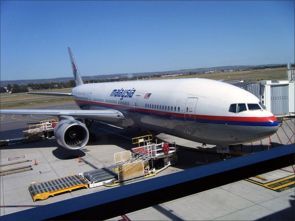 The acoustic pingers on the missing Malaysia Airlines plane's two black boxes were due for overhauls and battery replacements in 2012 but were never returned to their manufacturer, according to a media report.
The acoustic pingers on the missing Malaysia Airlines plane's two black boxes were due for overhauls and battery replacements in 2012 but were never returned to their manufacturer, according to a media report.
Anish Patel, president of pinger manufacturer Dukane Seacom of Sarasota, Florida, said the US National Transportation Safety Board has told his company that it manufactured the pingers on the Boeing 777-200's black boxes, formally known as the flight data recorder and the cockpit voice recorder.
The devices were manufactured in late 2005 and late 2006 and were due for overhauls and new batteries in 2012, Patel, the Indian-origin top executive, said.
But "we have no record of those units ever coming back for a battery replacement," he told CNN.
It leaves three possibilities, Patel said: The airline could have replaced the old pingers with new ones, it could have had another company perform the necessary maintenance, or it could have let the scheduled maintenance lapse, meaning the pingers would have a shortened battery life.
If the original batteries remain in the pingers, the battery life probably will have dropped from the required 30 days to 20 or 25 days, Patel, said.
Commenting on reports of a number of underwater sounds detected in the southern Indian Ocean and whether it came from the flight recorder of MH370, Patel said: The signal reported "is the standard beacon frequency" for the plane's cockpit voice recorder and the flight data recorder.
But he said additional equipment should be deployed quickly to the area from where the signals were detected.
"I'd like to see some additional assets on site quickly -- maybe some sonobuoys," Patel said, referring to 13-centimeter-long sonar systems that are dropped from aircraft or ships.
Malaysia Airlines did not respond last week to a question from CNN about whether the pingers on Flight 370 are compliant. But in an earlier e-mail about the airline's storage practices, the company said, "We are unaware of any issue with the ULB (pinger) or its batteries."
"This battery is not replaceable," the airline said. "The battery is built-in inside the (pinger) and installed by OEM -- Original Equipment Manufacturer."
The CEO Malaysia Airlines CEO Ahmad Jauhari Yahya on Saturday said the acoustic pinger batteries on the airlines' black boxes were due for replacement in June 2014.
"We can confirm there is a maintenance program. Batteries are replaced prior to expiration," he said.
The Beijing-bound Malaysian Airlines plane carrying 239 people, including five Indians, veered off course and vanished on March 8.
Authorities from around the world have been searching the remote areas in the Indian Ocean for the missing plane but have so far found nothing credible.
The lithium batteries are enclosed in the pinger, a watertight container roughly the size of a roll of silver dollars. Because pingers are sealed, airlines typically return them to the manufacturer for battery replacement, Patel said.
But airlines sometime choose to have other companies do the work, or they replace the pingers entirely, he said.
Patel said Malaysia Airlines used to send pingers to Dukane Seacom, a division of Radiant Power Corp., for maintenance, but has not in the "last couple years."
"Up until 2009, 2010, we used to see it on a regular basis. So they could have gone to another protocol such as doing it themselves, or they could have gone to another repair facility."
Or it could have let the maintenance lapse, he said.
"Theoretically, they could have 8-year-old batteries," Patel said.
Pingers are required to operate for a minimum of 30 days. To ensure that requirement, manufacturers install batteries that can last several days longer. Patel predicted that his pingers could work for 33 to 35 days, or perhaps longer, at full strength.
But that time span would decrease if the batteries were not replaced, he said.
The pinger sound, which is inaudible to human ears, does not stop immediately after it surpasses its full-strength design life, but fades over time.
The pinger will continue to emit signals with "progressively lower output levels until the unit shuts down," Patel said.
Meanwhile, Honeywell, the aerospace company that manufactured the black boxes on Flight 370, confirmed that the Dukane Seacom pingers were installed on the recorders at the time of manufacture, and remained on the boxes during maintenance checks in 2006 and 2007.
In 2006, the airline sent the cockpit voice recorder to Honeywell for an overhaul and modifications, Honeywell spokesman Steven Brecken said. The company noted in its paperwork that the pinger, also called a locator beacon, was set to expire in 2012, he said.
Image: Malaysia Airlines Boeing 777 flight
Photograph Mattchew02/Wikimedia Commons










